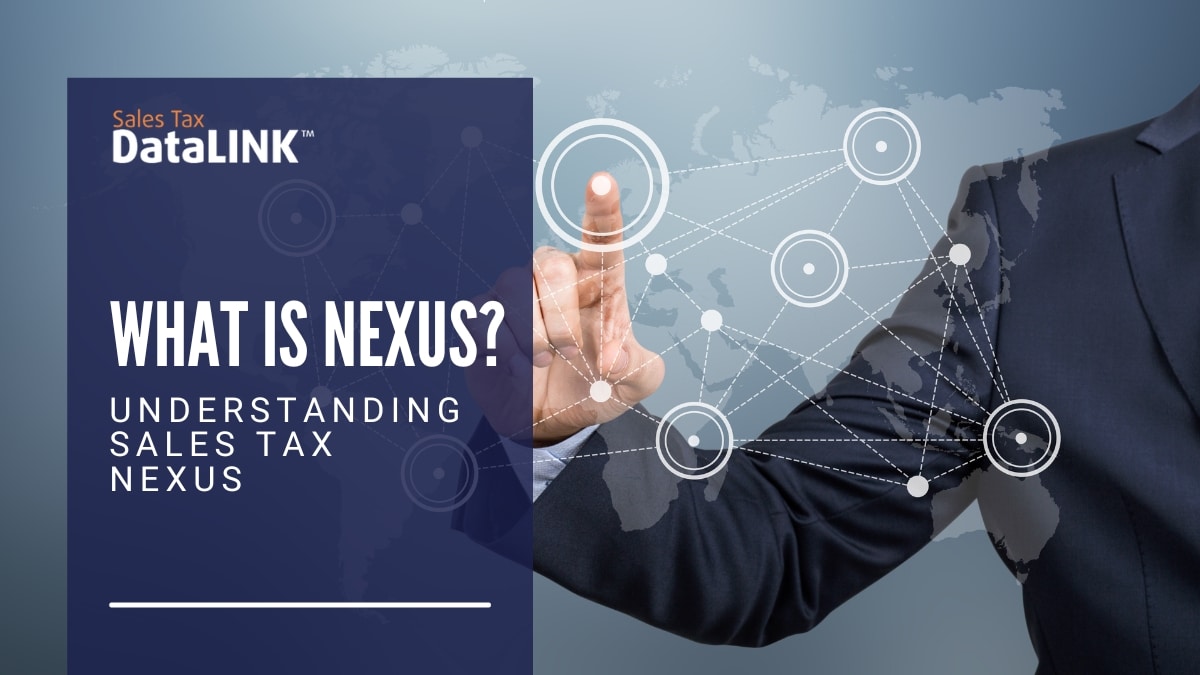Collecting sales tax can seem daunting, but stay calm and focus on three key questions:
- Where do you have nexus?
- Are your goods and services taxable there?
- What are the correct tax rates?
This article provides guidance on the first question – understanding sales tax nexus. With nexus expanded after Wayfair, determining your physical and economic connections across multiple states is crucial but complex. If you find this overwhelming, Sales Tax DataLINK can handle your compliance and filings. But if you want to build your understanding, keep reading to gain clarity on identifying sales tax nexus.
“Nexus” = “connection”
The word “nexus” means “connection.” There are thousands of sales tax jurisdictions in the United States, and the rule is that you must collect sales tax for every jurisdiction where you have a strong enough connection.
Before 2018, that meant a physical presence. You had to have a warehouse, office building, or some other actual physical connection with a state before you needed to think about collecting sales tax there. There were court cases that looked closely at the question of what constituted a physical presence, but generally speaking, the situation was fairly clear-cut.
https://www.salestaxdatalink.com/blog/do-we-still-care-about-physical-nexus/
Types of nexus
The Supreme Court decided in 2018, in a case called Wayfair, that states could make their own laws defining nexus for their state. Instead of a single national definition of nexus, every state gets to decide for its own state how it chooses to define nexus.
For example, your company has nexus for sales tax in Washington state if you have physical nexus, if you have $100,000 or more in revenue sourced in Washington (including wholesale revenue), or if your company is organized in Washington state.
So, for example, if you manufacture socks, you would have nexus in Washington state if either of these things is true:
- You have a warehouse in Seattle. This means you have a physical nexus.
- You have $90,000 in wholesale revenue from retailers in Washington State plus $10,000 in direct-to-consumer sales.
You will have to collect sales tax in Washington. You have nexus in either case. If you have $100,000 total revenue and any direct-to-consumer sales at all, you will have to register to collect sales tax and go through the whole filing process even if your retail sales are small.
Let’s say you also have connections in California, with one of these two scenarios:
- You lease a computer server in California. Under California law, this establishes a physical nexus.
- You have online sales of over $500,000 originating in California, but all are sales by retailers who buy your goods wholesale. They are responsible for collecting sales tax and you do not have economic nexus.
You have a sales tax nexus in California in the first case because you have a physical nexus. You don’t have to collect sales tax, though, because all your sales are wholesale. You don’t have economic nexus because, unlike Washington state, California doesn’t count wholesale revenue.
These are just two of the 50 states. Stripe reports that 80% of their customers sell to 20 or more states or countries. Everyone may have a different set of standards for defining nexus.
Consider that there are 50 states, 5 inhabited territories, and more than 12,000 sales tax jurisdictions in the United States. You must identify all the jurisdictions where you have revenue and determine for each one whether you have nexus or not.
https://www.salestaxdatalink.com/blog/creating-nexus/
Should you outsource?
Most of our clients find that they save both time and money by outsourcing sales tax compliance to Sales Tax DataLINK. Call now! 479-715-4275




